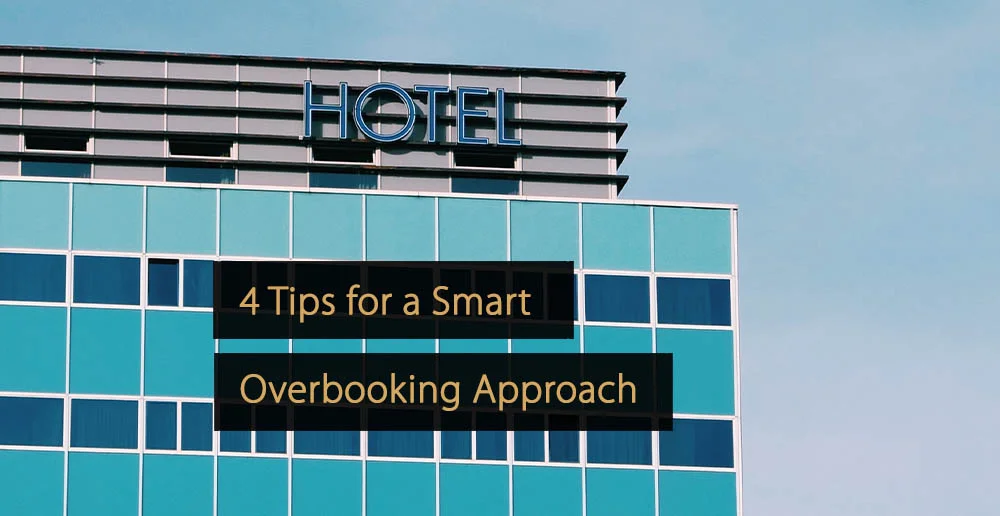While data certainly supports the practice under the right circumstances, overbooking is a subject that can easily put hotel staff on edge without careful implementation. No one is thrilled by the prospect of needing to relocate or “walk” a guest to another property because a statistically likely cancellation never materialized.
4 Useful Tips for a Smart Overbooking Approach
Plenty can be done to improve a potentially challenging scenario for staff and guests alike. Instead of avoiding the practice altogether and stunting your property’s revenue potential on high-demand days, hoteliers can take steps today to set their staff up for success.
1. Equip Your Front Desk Staff for Success
It’s tough having to be the bearer of bad news, and even worse if you’re not well-equipped to deal with the response. Hotels need to ensure they have clear and well-rehearsed procedures ready for overbooking situations. That means revenue managers communicate with the front office in advance that a walk is likely, and the front office knows exactly where to send these guests in advance.
Having a network to assist with walks is key. Front desk managers need to have an easily accessible list of hotels to cooperate with, whether that’s another local hotel from the same chain or an entirely independent property amenable to these arrangements. These established connections can help obtain a room when your hotel inevitably needs to relocate a guest, particularly if your property is willing to return the favor when roles are reversed.
It’s also critical for hotel staff to be trained and supported in these situations. When handled well, a guest walking to another property can turn a negative into a neutral or outright positive outcome. Poise and top-notch customer service skills can go a long way, but these situations also call for supplemental ‘perks’ to help smooth things over. At a minimum, a walked guest should have their transport to another location paid for, and their replacement room should ideally be an upgrade. Additionally, your guest recovery efforts can and should be supported by offering complimentary upgrades, amenities, or VIP statuses for future reservations.
2. Don’t Lose Sight of Net Revenue
The potential costs of walking a guest aren’t trivial, so revenue managers need to take a step back and consider the bigger picture as they fine-tune the aggressiveness of their overbooking strategy. The revenue lift of an overbooking strategy has to overcome not only the short-term costs of guest relocation but also the long-term impact on customer perception. That means sometimes it may be better for your property’s net revenue to be a room or two short of a sellout due to a more conservative approach.
3. Get Tactical with Choosing Who to Move
The impact of a walk is not uniform across guests, so it’s important to consider which guests may have better options for sending to another property. There are a variety of factors to consider here. Are they loyalty or rewards program members? What’s their status level? How often has the guest visited this property? What do they spend on average? Are there unique circumstances surrounding their stay (for example, a couple’s wedding night stay) that would make this move particularly frustrating?
Finding the best option will depend on the specific circumstances of the walk, but it’s best to consider the lifetime value of the guest to your property. Hoteliers should try to avoid walking high-value return guests to rival properties. On the other hand, a first-time guest who booked via a special OTA discount may not have much consideration for property loyalty as they’re showing their preference is for finding a good deal above all.
4. Use Forecasting Tools to Refine Your Process
A common mistake for hoteliers is trying to completely book out their properties too soon, which leads to missing out on higher price point bookings that come closer to a guest’s date of stay. Additionally, late cancellations from an early sell-out often lead to those newly available rooms being sold at a lower price. To avoid this, hoteliers need adaptable, accurate forecasting tools and careful monitoring of cancellation rates. Overbooking is a long-term strategy that needs careful and consistent review to help minimize the need for walking guests while maximizing revenue.
To reach their revenue potential, hotels need to ensure that their businesses are operating effectively and to their capacity. A strategic overbooking approach based on a sound foundation of analytics and impeccable customer service is an effective option for maximizing your hotel’s revenue potential. With the right tools, training, and strategies for overbooking in place, hoteliers are on track for revenue success.
Free Calculator: Discover Your Hotels Revenue Uplift Potential
Did you know that your hotel might be missing out on valuable revenue opportunities? In just 30 seconds, you can uncover the potential revenue uplift that awaits you with our powerful tool, the Revenue Uplift Calculator.
Click here to download the calculator “Hotel Revenue Uplift Calculator”.
More Tips to Grow Your Business
Revfine.com is the leading knowledge platform for the hospitality and travel industry. Professionals use our insights, strategies, and actionable tips to get inspired, optimize revenue, innovate processes, and improve customer experience.Explore expert advice on management, marketing, revenue management, operations, software, and technology in our dedicated Hotel, Hospitality, and Travel & Tourism categories.








Leave A Comment